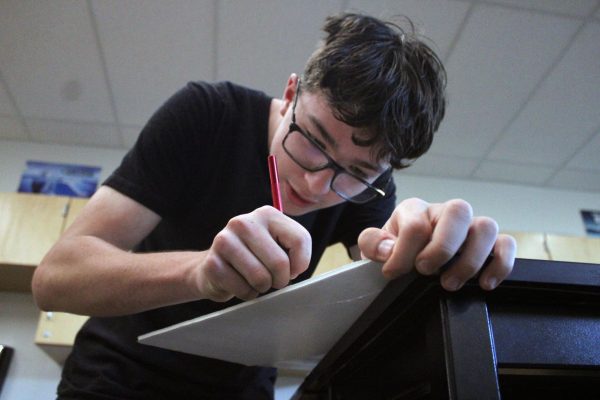French classes get festive learning experience from traditional baking
Some students take French in order to meet college entry requirements, others take it because they genuinely enjoy the language, but not many people expect for baking to be part of a foreign language class. Melissa Langston’s French one and three classes are certainly an outlier to that situation, as they baked a ‘buche de noel’ in order to learn how the French celebrate Christmas as compared to how Americans celebrate the holiday.
“Well it went wonderfully,” Langston said. “The cakes were delicious. It was a really good effort and I was very proud of the students who made cakes. I think all of the students enjoyed the activity. It was a little hard to judge because there was so many of them that were very good. The cakes were all different and that’s what I liked about it. There were some with raspberries and some used white chocolate and others used dark chocolate. Some added coffee to the recipes so they were all different. Everybody had their own take on what the recipe should be.”
Three different students from the French one class baked a ‘buche de noel’ often referred to as a Yule Log. The entire class got to see each cake untouched in order to judge on appearance and creativity and then each student got to eat a portion of each cake in order to judge it on taste.
“It was kind of disappointing because I thought more people would have joined in but there were only like three cakes,” sophomore Hannah Heger said. “ The cakes were pretty good though. All of the cakes seemed pretty equal as far as the taste, appearance and creativity goes. I hope the voting wasn’t easy. It was cool to bake something special just to celebrate Christmas in a French way. I would gladly do it again next year.”
The reason that the American term for it is Yule Log is due to the fact of the origin of the cake in French history. According to Stephanie Butler, a writer for history website, the delicacy originally came from the European Iron age, specifically 1100 B.C. The french would burn the log in order to welcome the end of the winter season, the days finally becoming longer and to hopefully quickly usher in spring. The ashes of these logs were thought to be extremely valuable and to bring good luck in the new year. Some thought that they would even be able to protect their house from lighting strikes. This was pretty important due to the fact everything was made of wood.
The French don’t celebrate holidays nearly as much as Americans do, so it might be a decent wait until the French classes experience something like this again.
“The way we celebrate Christmas compared to the way the French celebrate it are very much the same,” Langston said. “We make special foods for our Christmas and so do they, but this helped introduce students to some traditions and foods that we don’t typically make for the holidays.”



